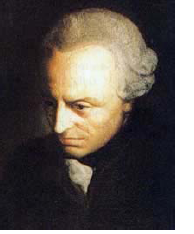Immanuel Kant (1724–1804), was a German philosopher who was born and lived his whole life in the East Prussian city of Königsberg (now Kaliningrad, in Russia), studying at the university and working there as a tutor then professor. Kant argued that the world appears the way it does to a significant extent because of the way the human mind conceives the world through ‘the cognitive faculties’ and the basic concepts on which these faculties are founded. Sensation and experience play a part, but the mind is certainly not a ‘blank page’, as strict empiricists would have us believe. For instance, space and time are prior concepts (a priori—to use the Latin technical term for this), that don’t necessarily exist in the world, but which our mind uses to help is make sense of experience. Kant argues that concepts help shape the meanings of the world.

[E]xperience is itself a species of knowledge which involves understanding; and understanding has rules which I must presuppose as being in me prior to objects being given to me, and therefore as being a priori [existing in the mind prior to experience] …
[N]othing in a priori knowledge can be ascribed to objects save what the thinking subject derives from itself … [S]pace and time are only forms of sensible intuition, and so only conditions of the existence of things as appearances … [W]e can therefore have no knowledge of any object as thing in itself, but only in so far as it is an object of sensible intuition, that is an appearance [a figment of our reasoning minds] …
It is unfortunate that only after we have spent much time in the collection of materials in somewhat random fashion at the suggestion of an idea lying hidden in our minds, and after we have, indeed, over a long period assembled the materials in a merely technical manner, does it first become possible for us to discern the idea in a clearer light, and to devise a whole architectonically in accordance with the ends of reason. Systems seem to be formed in the manner of lowly organisms through a generatio aequivoca from the mere confluence of assembled concepts, at first imperfect, and only gradually attaining to completeness …
[S]ystematic unity is what first raises ordinary knowledge to the rank of science, that is, makes a system out of a mere aggregate of knowledge …
[T]he common root of our faculty of knowledge divides and throws out two stems, one of which is reason. By reason I here understand the whole higher faculty of knowledge, and am therefore contrasting the rational with the empirical. If I abstract from all the content of knowledge, objectively regarded, then all knowledge, subjectively regarded, is either… cognitio ex datis [knowledge of facts] or … cognitio ex principiis [rational knowledge]. However a mode of knowledge may originally be given, it is still, in relation to the individual who possesses it, simply [empirical], if he knows only so much of it as has been given to him from outside (and this in the form in which it has been given to him), whether through immediate experience or narration, or (as in the case of general knowledge) through instruction. Anyone, therefore, who has learnt (in the strict sense of that term) a system of philosophy … although he may have all its principles, explanations, and proofs, together with the formal divisions of the whole body of doctrine, in his head, and, so to speak, at his fingers’ ends, has no more than a complete historical knowledge of [that] philosophy. He knows and judges only what has been given him. If we dispute a definition, he does not know whence to obtain another. He has formed his mind on another’s, and the imitative faculty is not itself productive. In other words, his knowledge has not in him arisen out of reason, and although, objectively considered, it is indeed knowledge due to reason, it is yet … merely [empirical]. He has grasped and kept; that is, he has learnt well, and is merely a plaster-cast of a living man [the philosopher he has learnt]. Modes of rational knowledge which are rational objectively … when they have been derived from universal sources of reason, that is, from principles—the sources from which there can also arise criticism, nay, even the rejection of what has been learnt. All knowledge arising out of reason is derived either from concepts or from the construction of concepts …
Reason must in all its undertakings subject itself to criticism; should it limit freedom of criticism by any prohibitions, it must harm itself, drawing upon itself a damaging suspicion. Nothing is so important through its usefulness, nothing so sacred, that it may be exempted from this searching examination, which knows no respect for persons. Reason depends on this freedom for its very existence. For reason has no dictatorial authority; its verdict is always simply the agreement of free citizens, of whom each one must be permitted to express, without let or hindrance, his objections or even his veto.
Kant, Immanuel. 1781 (1933). Critique of Pure Reason. London: Macmillan. pp. 20, 22, 25, 27, 655, 653, 655–656, 329. || Amazon || WorldCat
